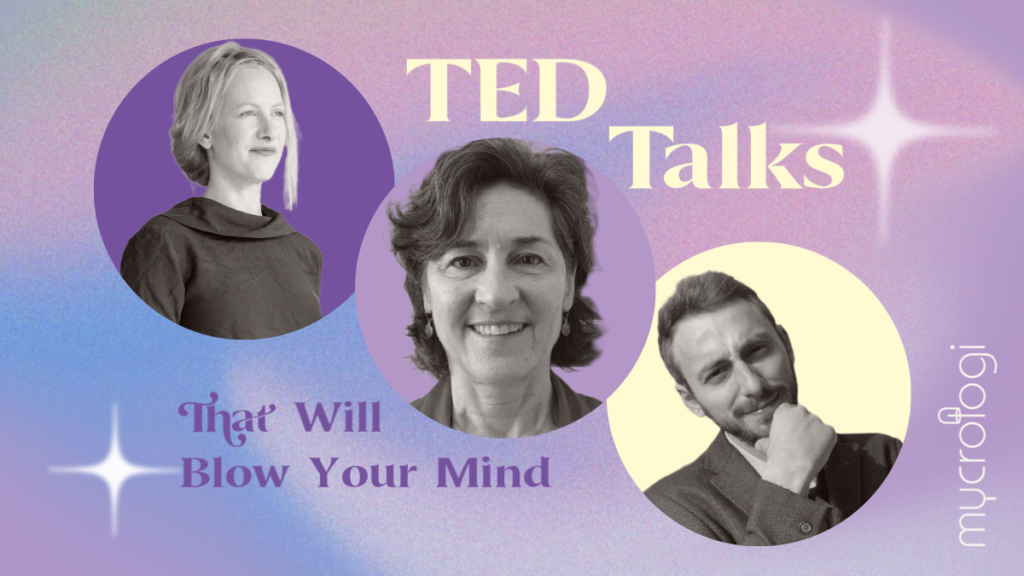No products in the cart.
Education
3 TED Talks that will Blow Your Mind About Mushrooms
Ted Talk #1: Psilocybin, love and the meaning of life: Mary Cosimano
You know that age-old saying “love makes the world go round” ? Well, the concept may garner significant credibility through Mary Cosimano’s captivating 2020 Ted talk. Mary’s less than 15 minute discussion utilizes her deep insights to underscore the truly profound concept of love and connection, and how psilocybin may hold the capacity to treat a range of vexing issues. From opioid addiction, depression, anorexia, Alzheimers, and beyond, Mary Cosimano, who has been studying medicine in the department of Psychiatry at John Hopkins University since 2000, expresses unbendable faith toward psilocybin-based treatment as a result of various successful studies over her years of medicine practice.
Researchers at the school of medicine were recently offered a staggering $17 million grant, allowing this impressive group of medicine experts to open a centre for psychedelic and consciousness research, so they may continue to build on their work. This massive grant would not come from thin air but would be a reflection of the undeniably promising results that have been uncovered in prior studies. Examples of these studies include a cancer study treating patients with end-of-life cancer diagnoses, which resulted in an 83% clinically significant decrease in anxiety and depression symptoms among participants at the 6-month follow-up. A pilot study for smoking cessation delivered additional findings, showing an impressive 80% abstinence rate in participants at the 6-month follow-up mark. Furthermore, in a depression study, it was found that 70% of participants displayed clinically significant improvements in depression symptoms, with an incredible 50% of participants experiencing full remission of the disorder and essentially returning to normal.
Keep in mind that these individuals aren’t receiving a therapist’s guidance alongside a daily mushroom prescription. What truly amplifies the sense of hope and astonishment surrounding this research is the notion that one single guided psilocybin session could have the potential to generate enduring, and in some cases, permanent transformation for patients who have endured years of treatment-resistant suffering. However, that does not mean it is a simple treatment. Cosimano emphasizes that the studies conducted by John Hopkins Researchers bear no resemblance to the mushroom trips you might take with friends. The successful studies were designed to function in three distinct phases, commencing with preparatory meetings that establish trust between participants and their guide, followed by the phase in which a guided psilocybin session takes place, and concluding with a crucial integration stage where the profound meaning of these sessions is assimilated into real life.
Mary Cosimano’s passion toward this avenue of practice largely stems from the relationships and connections of which she has accumulated over 20 years of work. The devotion and passion to the study can only be amplified by the stellar advancements psilocybin has displayed, leading to the now 17 million dollar colossal grant that may very well introduce psilocybin-treatment to the general public in years to come.
Ted Talk #2: Can Magic Mushrooms Unlock Depression?: Rosalind Watts
Rosalind Watts is a clinical psychologist at the psychedelic research group at Imperial College. The group is led by Robin Carhart-Harris, a pioneering neuroscientist, and David Nutt, a world-renowned psychopharmacologist. Years of hard work and devotion to the subject of medicine allowed these experts to do the first psilocybin for depression study in 2016. Participants suffering from depression were given a high dose of psilocybin in a therapeutic setting, where researchers watched depression scores drop significantly—lower than in studies regarding more traditional forms of treatment such as antidepressants or conventional therapy.
Rosalind details the contrast between psilocybin treatment and conventional antidepressants, mentioning that antidepressants will have patients on a pill everyday, which can often be accompanied by unpleasant side effects as well as weeks of nothing before the drug can actually be felt. In the psilocybin study, experts watched depression symptoms mitigate immediately, and believe unlike a palliative treatment like antidepressants, psilocybin treatment may pose the idea of a significant cure for these disorders.
What sets this TED Talk apart from others on psilocybin treatment is how Rosalind takes the time to explain what it truly means for psilocybin to “unlock” the brain and, ultimately, “unlock” depression. When examining the effects of psilocybin in brain scans, the scans reveal that psilocybin shifted the brain from a rigid state to one of flexibility. In this state of flexibility, the brain is believed to become more adaptable to change and open to new perspectives. This point is underscored as Rosalind discusses the interviews she conducted with patients post-treatment. John, a study participant grappling with deep-seated, unresolved trauma, described undergoing a cathartic experience that enabled him not only to accept his trauma but also to heal from it. One of Rosalind’s impactful statements highlights that these studies witnessed, in only six hours, what often takes six years of conventional therapy to achieve. John elaborates that during the session, he felt his brain being reorganized, leading to clearer thoughts and reduced rumination. Other study participants shared similar experiences, such as a long-standing mental fog dissipating in an instant—a mental reboot of sorts. These testimonials offer poignant insights that reshape the landscape of contemporary mental health treatment.
The conclusion of the talk highlights the challenge of providing sustainable funding for extensive psychotherapy to meet the needs of everyone. By seamlessly integrating psilocybin with current short-term therapeutic approaches, we could potentially enhance the potency and long-term effectiveness of these treatments.
Ted Talk #3: Psychedelics: effects on the human brain and physiology: Simeon Keremedchiev
Coming from a legal background, Simeon Keremedchiev’s interest in human consciousness led him to pursue a degree in psychology and ultimately brought him to the TED talk stage, where he educates the world about the mechanisms and profound capabilities of psilocybin. He begins by addressing the inner workings of the human brain, where billions of neurons exchange information, enabling us to feel, think, and memorize. He compares the adult brain to that of a child, highlighting that the child’s brain utilizes a much larger sum of neurological potential and capacity than ours. Simeon then shifts the focus to a brain region we are now quite familiar with: the Default Mode Network, which is active when we are not engaged in specific tasks. Anytime we think about ourselves, others, the future, or the past, our DMN is active. Due to its default activity for most of us, by the time we reach ages 6-12, this Default Mode Network becomes so reinforced that it is nearly impossible to think outside of it.
Simeon Keremedchiev educates the audience on this brain region, in order to exemplify the profound capabilities of psilocybin on both these crucial regions of the brain. Interestingly, we learn that psilocin (the active compound in psilocybin) molecule, is an exact replica of our serotonin molecule which we produce on our own. Simeon elaborates that the way in which psilocybin binds with our serotonin receptors is truly magnificent, for it causes no harm to the receptor whatsoever. He uses the Imperial College depression study as an example of this phenomenal process.
Regarding the child’s brain, which utilizes a significantly greater portion of its own brain capacity, we can speculate that by deactivating our default resources, such as the DMN regions, we might observe an enhanced resemblance to the functioning of a child’s brain. Psilocybin possesses the capacity to reduce DMN activity and modify neuronal functions, thereby impacting diverse perceptual, cognitive, and emotional facets of the brain that become accessible under the influence of psilocybin.
Although psilocybin is a highly potent substance that triggers intense visual and auditory hallucinations, it is truly remarkable to hear Simeon’s observation that, upon examining brain scans, the human brain on psilocybin closely resembles the human brain in a meditative state. When the DMN (Default Mode Network) region of the brain slows down to an inactive state, we become more susceptible to experiencing ego dissolution—an often-discussed outcome of psychedelic use. This temporary loss of self is believed to create a space for profound spiritual insights and self-development. This prompts us to question the true significance of self-identity and its potential impact on mental health.
TED talks, exemplified by speakers like Mary Cosimano, Rosalind Watts, and Simeon Keremedchiev, among others, provide an influential and progressive platform for the discussion of psychedelic advancements. Summaries can only scratch the surface of the profound insights shared in these talks. Therefore, we strongly encourage you to watch the videos linked above, you won’t regret it.


